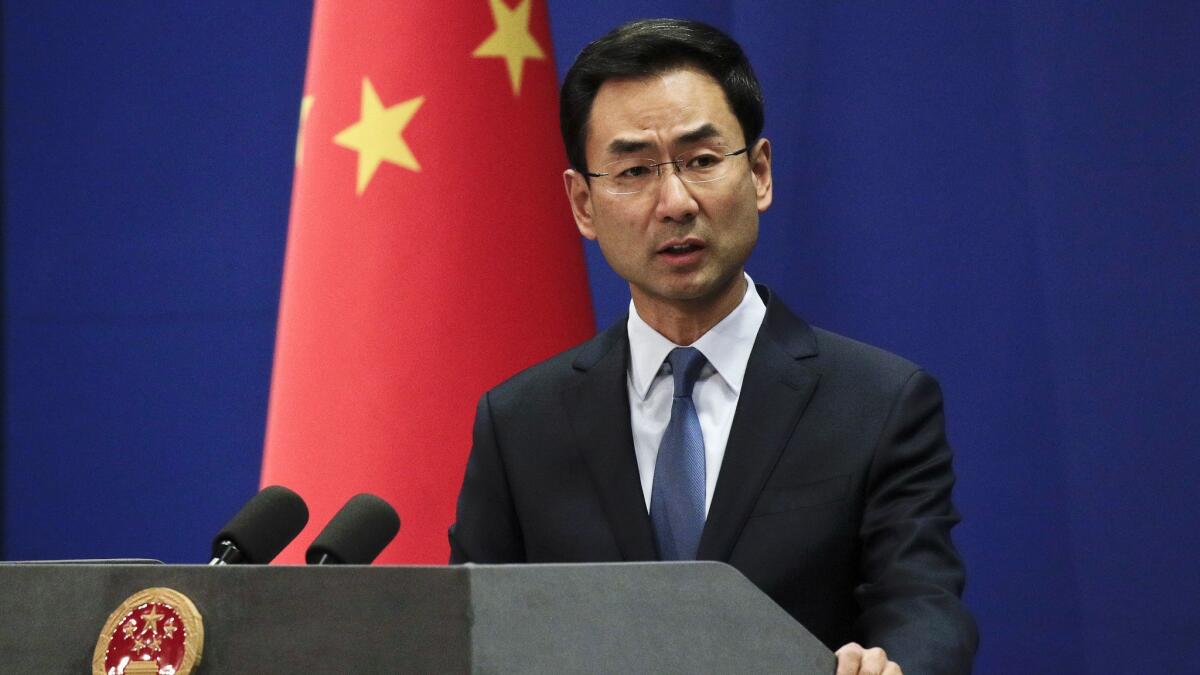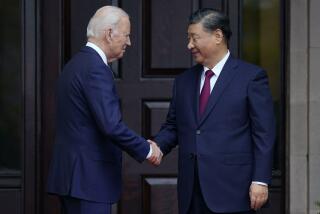China says U.S. charges against Huawei and its executive are ‘immoral’ political manipulations

Reporting from Beijing — China’s government on Tuesday condemned U.S. indictments against the Chinese tech giant Huawei as “deep political motivations and manipulations,” as relations between the world’s two largest economies hardened on the eve of crucial trade talks.
U.S. officials on Monday announced indictments filed in Brooklyn accusing Huawei’s chief financial officer, Meng Wanzhou, and others of fraud aimed at skirting U.S. sanctions on Iran — and in Seattle alleging Huawei tried to steal robot technology used to test cellphones from T-Mobile.
The timing, just before Washington trade talks aimed at resolving the bitter U.S.-China trade war, fueled Chinese suspicions that the United States is using legal action as a political lever against China and the company.
Huawei is under intense pressure from the United States, which has largely barred use of Huawei technology by government contractors and is pressing allies to ban Huawei technology from 5G networks, arguing it poses a threat to national security.
China sees itself as the victim of a containment strategy by Washington to frustrate its ambitions to become a global leader in high-tech fields. The indictments against Huawei — which sells more smartphones than Apple — are perceived by many Chinese officials as a major part of the strategy.
The Chinese Foreign Ministry said Tuesday that it was “highly concerned” about the “immoral” charges against Huawei and Meng, who is the daughter of Huawei founder Ren Zhengfei.
“For some time now the U.S. has been using its state power to smear and attack specific Chinese companies in an attempt to strangle their lawful and legitimate operations,” said Foreign Ministry spokesman Geng Shuang. “We strongly urge the U.S. to stop its unreasonable bashing of Chinese companies including Huawei, and to treat them fairly and objectively,” he said, adding that China was determined to defend its companies.
Meng’s arrest in Canada last month has provoked a furious, sustained campaign from China to persuade the Canadian government to release her without extraditing her to the U.S. — a move that would breach Canada’s extradition treaty obligations.
Huawei is China’s most successful high-tech firm and one of its most prominent global champions, raising questions about whether Chinese firms can succeed in global markets if pressed by the U.S. government.
The U.S. has banned government use of Huawei technology in 5G networks and demanded allies do the same. Australia, New Zealand and Japan have done so while in Europe, companies such as Orange and BT Group have announced they are excluding Huawei technology from core 5G systems, while Deutsche Telekom has announced it is reconsidering its procurement plans. Canada’s government, under intense pressure from the United States, is considering the matter. Vodafone announced last week it was suspending Huawei’s participation in its 5G system.
Poland, where a Huawei employee was arrested this month on suspicion of spying, is also considering whether to exclude Huawei from 5G networks, as are Norway, Belgium and the Czech Republic. The setbacks for Huawei in Europe’s 5G networks are a massive potential blow to the company’s profits and development.
Huawei in Poland sacked the employee, Wang Weijing, adding it required all employees to obey the laws of the countries in which it operates.
Part of the concern surrounding Huawei relates to a provision in Chinese law mandating that all companies cooperate and collaborate with the national government on matters of national intelligence. This raises concerns that if Chinese authorities were to demand sensitive data from Huawei, the firm would have to comply.
“Companies like Huawei pose a dual threat to both our economic and national security, and the magnitude of these charges make clear just how seriously the FBI takes this threat,” said FBI Director Christopher A. Wray at a Monday news conference. “Today should serve as a warning that we will not tolerate businesses that violate our laws, obstruct justice, or jeopardize national and economic well-being.”
Huawei on Tuesday said it was disappointed at the charges and denied it had broken U.S. law.
“The company denied that it or its subsidiary of affiliates have committed any of the asserted violations of U.S. law set forth in each of the indictments, is not aware of any wrongdoing by Meng and believes the U.S. courts will ultimately reach the same conclusion,” Huawei said in a statement.
Ren recently denied that he would ever allow his company’s technology to be used for spying.
“I love my country. I support the Communist Party. But I will not do anything to harm the world,” Ren told journalists recently at his company headquarters in Shenzhen, southern China. “We would rather shut Huawei down than do anything that would damage the interests of our customers to seek our own gains.”
China repeated its call Tuesday for Washington to drop the indictment against Meng and to stop extradition proceedings.
“We again urge the U.S. to immediately withdraw its arrest warrant for Meng Wanzhou and to refrain from issuing a formal extradition request, to avoid going further and further down a mistaken path,” Geng said. He said Washington and Ottawa had abused their extradition treaty, taking unjustified action that jeopardized Meng’s rights.
Meng is on bail in Canada awaiting an extradition hearing.
More to Read
Sign up for Essential California
The most important California stories and recommendations in your inbox every morning.
You may occasionally receive promotional content from the Los Angeles Times.










